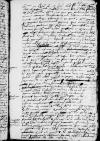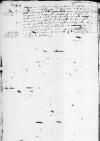Ex ⌊⌋ Dominationis Vestrae Reverendissimae ea, quae pro paterno suo in me amore ratione coadiutoriae me latere noluit, habunde intellexi, planeque in eo
Dominationis Vestrae Reverendissimae erga me propensissimam benevolentiam cognovi, qua mecum de omnibus sub vera paterna agit fiducia, non permittens me ignorare quicquam earum rerum, quas usui et ex re mihi aliquando futuras esse arbitratur. Quemadmodum in litteris suis ad ⌊venerabilem dominum custodem Varmiensem⌋, quarum mihi exemplum misit, liquido declaravit. Ceterum, cum nesciam adhuc, immo et Dominatio Vestra Reverendissima, cuiusmodi articulorum[1] moderatio facta sit, quodque ob id, priusquam ⌊dominus custos⌋ cum ⌊suo collega⌋ ad me se conferat , Dominatio vestra Reverendissima convenire debeat, videretur mihi, modo Dominationi Vestrae
Reverendissimae non displiceret, ut totum hoc negotium apud Dominationem
Vestram Reverendissimam tractaretur, ne foret opus quippiam in novam
consultationem aut ad ⌊capitulum⌋ referre. Quandoquidem, si quid eiusmodi in ipsis articulis [e]mergeret, quod consilio et declaratione Dominationis Vestrae Reverendissimae egeret, ne inter nos infecta re discederetur, ad Dominationem Vestram Reverendissimam esset recurrendum. Interea vero,
cf. Adagia 1526 No. 2759 Ut nunc sunt homines ⌊ut nunc sunt e[t] homines, et temporacf. Adagia 1526 No. 2759 Ut nunc sunt homines ⌋, multa incidere possent, velit itaque non gravari Dominatio Vestra Reverendissima et hanc pro sua in me benevolentia ac paterno amore utcumque subire molestiam, ut ipse possim unacum ⌊domino custode⌋ et ⌊collega eius⌋ coram Dominatione Vestra Reverendissima constitui transigereque omnia. Venturus quidem sum paucis comitatus, resque haec Deo duce bene cepta multo facilius et solidius ad eum modum praesente Dominatione Vestra Reverendissima moderari conficique poterit. Mitto igitur, ut sim de mente Dominationis Vestrae Reverendissimae in iis certior, hunc meum nuntium. Quod non inivissem consilium, nisi quaedam et in Dominationis Vestrae Reverendissimae atque etiam⌊domini custodis⌋ inessent litteris, quae me ad Dominationem Vestram Reverendissimam pertrahunt, quam etiam iam a multo tempore [o]b causas [p]lurimas et necessarias sanam et felicem videre cupimus. Accedit, quod interea etiam nuntius meus redibit ex ⌊Cracovia⌋, qui recta ad Dominationem Vestram Reverendissimam advolabit, ubi tum, Deo auspice, futurus sum . Quem, ut eandem Dominationem Vestram Reverendissimam quam diutissime incolumem prosperrimamque conservet, precor ex animo.
Scripserat mihi ante aliquot dies Dominatio Vestra Reverendissima
postulans certior fieri, quomodo negotium ⌊Cracoviae⌋ inter ⌊Elbingenses⌋ et ⌊Insulares⌋ sit transactum, ad qu[od], similiter ut de concilio, aliis cogitationibus , quae memoriam distraxeran[t], occupatus non respondi. Audita fuit causa a ⌊ maiestate regia⌋ in frequenti ⌊Regni senatu⌋ nobis etiam ⌊Prutenis⌋ praesentibus . Variat[is] tum demum tot ex affectu sententiis eo deventum est, quod
rec[entibus] oculis, quemadmodum prius in consilio nostro fuit decretum, subiici per certos revisores debeat, et iterum (si recte memini) ad consilium nostrum referri, indeque cognitio totius causae adiecta sententia nostra sub sigillo ad ⌊maiestatem regiam⌋ remitti. ⌊Reginalis maiestas⌋ plurimum ea in re fuerat sollicita etc.
[1 ] From the mid-15th century the Warmia Chapter presented every bishop elect with election capitulations (the articuli iurati) for him to sign. These obligated the bishop to defend the rights and privileges of the Church in Warmia and to recognize that the Chapter and the bishop were partners in managing the diocese. The capitulations also concerned more detailed issues of finances and jurisdiction. (cf. cf. BORAWSKA 1984 p. p. 75, 76, 209 ⌊Borawska, 1984, p. 75, 76, 209cf. BORAWSKA 1984 p. p. 75, 76, 209 ⌋, and also Articuli iurati Episcopi Ioannis Dantisci (copy from the 16th/17th century AAWO, Dok.Kap.A4/36))

